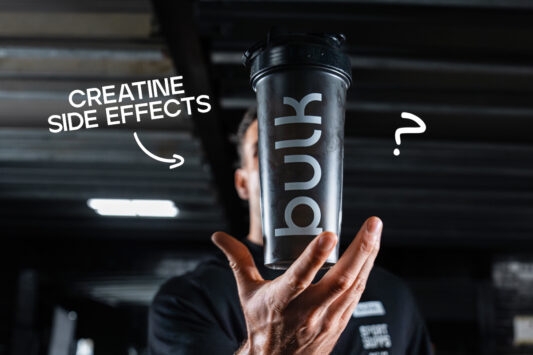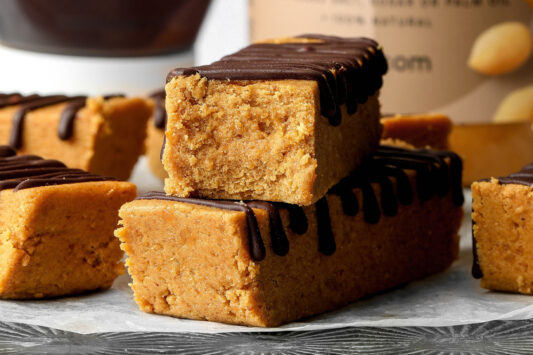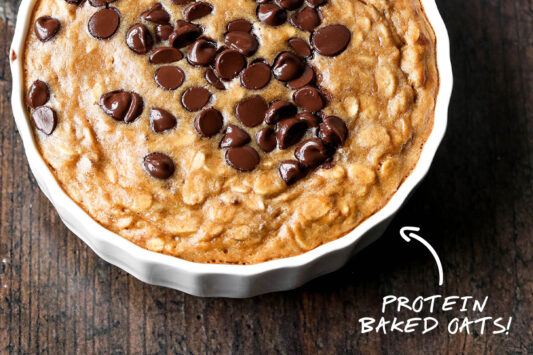We all have days when we’re a little lacking in energy and may find it harder to build up the strength for a workout. There are also times when we might want to push ourselves a bit further. This is where pre-workouts come in – a popular sports supplement to help boost energy for many types of exercise. But should we be using them for cardio, and if so, how do they help?
Pre-workouts have skyrocketed in popularity over the last couple of years, and many trainers are incorporating them into their routines (1). Typically, pre-workouts have been associated with resistance training because they are super useful in getting the most out of your workout.
However, cardio is a strenuous form of exercise, so having an additional boost before starting could help improve mindset, performance and endurance. Here we answer not only why a pre-workout could be beneficial for cardio, but how to use one safely.
What is pre-workout?
A pre-workout is a sports supplement commonly used to fuel the body and enhance performance during exercise. Formulasvary in components and ingredients depending on who and what activity they’re tailored for. Pre-workouts can be found as single-ingredient or multi-ingredient (MIPS) supplements. They are available with and without stimulants and come in many different physical forms including powder, liquid and pills (2).
What is in pre-workout?
Amino Acids
A pre-workout consists of a blend of ingredients tailored to boost energy levels while helping to support focus, reduce fatigue and speed up recovery time post-workout. These include beta-alanine, taurine, citrulline malate and branched-chain amino acids (BCAAs).
Generally, BCAAs are sourced from the diet, but those who wish to push themselves further may require additional sources to fuel their bodies. Within pre-workouts, BCAAs consist of a ratio of leucine, isoleucine and valine, typically in a 2:1:1 ratio. Some studies have suggested that BCAAs can assist in post-workout recovery.
Caffeine
Research suggests that pre-workouts including caffeine provide benefits such as muscular endurance, increased energy and a better ‘pump’ (3), so caffeine is often included in pre-workouts to increase focus during a workout by providing a boost to both mind and body. However, with a tailored formulation of amino acids, the same result can be achieved with a caffeine-free pre-workout (more on these later).
Creatine
Some pre-workouts choose to have creatine as a listed ingredient. The addition of creatine to a pre-workout supplement can aid the body to increase physical performance during high-intensity exercise in successive short bursts over a short period of time (4). ATP is the predominant energy source for high-intensity exercise (5).
For more information, see our how to take creatine.
A combination of supplements works to provide your body with a great set-up to achieve a fulfilling workout. Using the most appropriate supplement for you can help you to train harder, creating more stimulus for muscle growth (6). With that being said, the individual benefits of each supplement suggest that a pre-workout would be beneficial to cardio workouts as well as weight training.
Now that you know the main purpose and components of a pre-workout, you’re probably wondering how it relates to cardiovascular exercise and how to use it in conjunction with cardio. That’s why you’re here, after all.
Can you take pre-workout and do cardio?
There is a preconception that pre-workouts are exclusively for hardcore gym-goers and heavy lifters. Although there are studies and science that support the usage of pre-workouts within those settings, emerging research suggests that a pre-workout can be beneficial for cardio too (7).
So yes, in short, pre-workout can be taken prior to cardio, whether it be a jog around the park, an endurance-based sport or a high-intensity HIIT session.
As pre-workouts provide an energy boost alongside many other benefits, they have been seen to be popular before cardiovascular exercise. Within weight training, the extra boost in energy is targeted at improved strength and power which helps to enable trainers to achieve those heavier lifts. For cardio, a pre-workout would be more tailored to prolonging the period of physical activity (endurance).
However, that extra boost of energy may not be required every time. For example, a leisurely walk at a consistent pace would not require that additional energy boost that pre-workout provides.
On the other hand, if you were partaking in high-intensity interval training (HIIT) you may feel an immense benefit in taking pre-workout. Think about a session where you transition between sprinting for 30 seconds and then dropping down to a walk or light jog for one to two minutes in intervals. This is perfect for pre-workout supplementation.
Pre-workout and steady-state cardio
There are two states of cardio: steady and high-intensity interval. Steady cardio refers to a form of physical activity that is undertaken with a low intensity and consistent pace. However, high-intensity interval training combines together a series of low-intensity and high-intensity exercises.
Can you use pre-workout before running?
Yes, you can use a pre-workout before a run. The ingredients are all geared towards energy increase and focus, both of which are definitely required for running.
For long-distance or marathon running, a pre-workout containing electrolytes could help with endurance and retaining fluid within the muscles. This is because electrolytes are typically lost through sweat and need to be replenished after an hour or so.
However, combining the pre-workout and electrolytes together is not necessary. The two supplements can be taken separately and still have the same benefits.
Pre-workout and HIIT
It may be more beneficial to use a pre-workout for HIIT over low intensity, due to the intense and hard-pushing nature of the exercise.
HIIT involves alternating back to intense exercise after a period of low intensity, and this sequence would benefit from the constant energy provided by a pre-workout supplement. However, that’s not to say that pre-workout is not beneficial to low-intensity training.
How do you take pre-workout for cardio?
Timing
Caffeine pre-workouts are typically recommended to be taken 30 minutes to one hour prior to exercise. This is because caffeine is rapidly absorbed in the bloodstream and hits peak levels an hour after consumption (9).
This timing allows for the supplement to increase energy levels and allow for a warm-up before the main exercise, optimising focus at the most crucial stage. Due to the caffeine content, pre-workouts can last anywhere up to two hours after consumption.
This is used to describe the period of time in which it takes for a substance such as caffeine to reduce its effectiveness in half. Caffeine has a rough half-life of 4-6 hours after consumption, meaning you would still have a decent amount of caffeine within your body at this time (10). This would also lend a pre-workout to help with endurance.
Dosage
Although pre-workouts are deemed a safe product to use, using the supplement every day could have some side effects. Ingredients such as caffeine, consumed in high doses, can cause stomach distress.
As recommended by the European Food Safety Authority, 400mg of caffeine a day for healthy adults is not deemed to be concerning, but exceeding this amount should be avoided.
Tolerance
Taking pre-workout too much creates tolerance. They are designed to support your workout as and when needed.
The most effective way to combat tolerance is to pause your intake for a short period of time. Alternatively, consider switching to a caffeine-free pre-workout. We would recommend always reading the fine print and ingredients listed on the packaging and only taking the recommended dose.
When shouldn’t you take a pre-workout for cardio?
As mentioned above, a pre-workout works best with high-intensity training due to the increase in energy, whether this is aerobic or anaerobic exercise. Therefore some of the benefits of a pre-workout may not be there with lower-intensity exercise. You just don’t need it.
The suitability of a pre-workout comes down to how you feel on the day and just before your workout. Some days you may feel like you need a boost to help you through the workout, whereas other days you may feel energised without the need for one
Late-night training
If you’re a night owl or have a busy schedule, your training times may fall outside the norm. Late-night intake of caffeine impacts sleep quality – often causing restlessness. But there’s a solution: a caffeine-free supplement such as our Pre-Workout Caffeine Free or our Pump Pre Workout (stimulant free) may be better suited.
Which is the best pre-workout for cardio?
Here at Bulk™, we have a selection of pre-workouts to choose from to suit individual fitness levels and training needs. Our Complete Pre-Workout™ would lend itself in supporting cardiovascular training due to its comprehensive formula. This pre-workout is an all-rounder and is great for experienced trainers or for anyone just starting out.
Our Pre-Workout Caffeine-Free formula would also be suitable due to its inclusion of electrolytes within the blend and contains everything you need to get the most out of your session.
Also, as the product contains no caffeine or stimulants, you are not limited to when you can use the supplement so it’s great for those evening and late-night training sessions. We can’t promise it will make the benches free though.
Other products within our pre-workout range include Pump Pre-Workout and our Elevate Pre-Workout. The latter product falls within our Bulk Pro series of supplements, designed for professional athletes and serious trainers. Subtle flex here, but Elevate was chosen as the ‘Best Overall’ supplement in ‘The Best Pre-Workouts To Buy in 2022’ by Men’s Health magazine. Read all about it here.
Summary
While we have focused on whether pre-workout is suitable for cardio, it’s important to consider the suitability and individuality aspects of supplements. There isn’t one size that fits all. The most important thing to consider is how your body feels, what it needs and how best to fuel it.
Pre-workout can have great benefits and provide support for your body during training sessions and help you excel with your fitness goals. However, it should not be used in place of balanced nutrition. A solid cardio session should still be achievable without the use of it.
Keep in mind that pre-workout is not necessary for every workout you do. Instead, save it for feeling you need an extra boost to push yourself, whether it be cardio or weight training.
At Bulk™, we believe in encouraging everyone to find their passion for exercise. For more fitness content check out @bulk for recipes, ambassador workouts and gym tips and join our community of fitness lovers and foodies.
What does pre-workout do?
Why does pre-workout make you itch?
What to eat before a workout
Creatine in pre workout
Beta alanine benefits
















